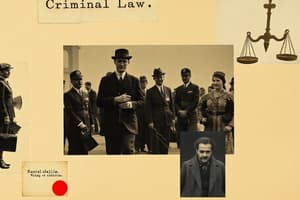Podcast
Questions and Answers
Quel terme désigne un groupe de personnes qui s'associent pour commettre des infractions?
Quel terme désigne un groupe de personnes qui s'associent pour commettre des infractions?
- Faute intentionnelle
- Association de malfaiteurs (correct)
- Infraction individuelle
- Responsabilité collective
Quelle est la principale caractéristique de la responsabilité personnelle dans le cadre d'infractions collectives?
Quelle est la principale caractéristique de la responsabilité personnelle dans le cadre d'infractions collectives?
- Tous les membres sont responsables de manière égale
- Chaque individu doit avoir personnellement commis une faute (correct)
- La responsabilité est partagée entre tous
- On ne peut pas poursuivre les participants
Quelles sont les deux grandes modalités de participation personnelle à une infraction?
Quelles sont les deux grandes modalités de participation personnelle à une infraction?
- Complicité et responsabilité personnelle
- Co-action et complicité (correct)
- Concentration et co-action
- Cohésion et complicité
Dans quelles circonstances peut-on appliquer la théorie des fautes conjuguées?
Dans quelles circonstances peut-on appliquer la théorie des fautes conjuguées?
Qu'est-ce que la co-action implique dans le cadre d'une infraction collective?
Qu'est-ce que la co-action implique dans le cadre d'une infraction collective?
Quelle est la définition correcte de la complicité selon l'article 121-7?
Quelle est la définition correcte de la complicité selon l'article 121-7?
Quel concept est associé aux infractions commises par plusieurs agents en synergie?
Quel concept est associé aux infractions commises par plusieurs agents en synergie?
Quel est le principe fondamental en matière de responsabilité pénale?
Quel est le principe fondamental en matière de responsabilité pénale?
Comment se différencie la responsabilité pénale de la responsabilité civile?
Comment se différencie la responsabilité pénale de la responsabilité civile?
Depuis quelle année le principe de responsabilité pénale personnelle a-t-il été codifié dans le code pénal français?
Depuis quelle année le principe de responsabilité pénale personnelle a-t-il été codifié dans le code pénal français?
Quel élément est nécessaire pour imputer une infraction à un auteur principal?
Quel élément est nécessaire pour imputer une infraction à un auteur principal?
Les parents peuvent-ils être tenus responsables pénalement des actes de leurs enfants?
Les parents peuvent-ils être tenus responsables pénalement des actes de leurs enfants?
Quelle est la distinction clé entre la responsabilité pénale et la responsabilité du fait d'autrui?
Quelle est la distinction clé entre la responsabilité pénale et la responsabilité du fait d'autrui?
Dans le cas de plusieurs agents impliqués dans une infraction, quelle est l'une des façons dont la responsabilité peut être attribuée?
Dans le cas de plusieurs agents impliqués dans une infraction, quelle est l'une des façons dont la responsabilité peut être attribuée?
Quels éléments doivent être réunis pour que la responsabilité personnelle soit établie?
Quels éléments doivent être réunis pour que la responsabilité personnelle soit établie?
Quel principe coutumier concernant la responsabilité a été respecté depuis l'Ancien Régime?
Quel principe coutumier concernant la responsabilité a été respecté depuis l'Ancien Régime?
Quel est le critère essentiel pour qu'un acte de complicité soit constitué?
Quel est le critère essentiel pour qu'un acte de complicité soit constitué?
Quelle affirmation est vraie concernant les causes d'irresponsabilité?
Quelle affirmation est vraie concernant les causes d'irresponsabilité?
Comment le complice est-il traité par la loi selon le principe d'assimilation?
Comment le complice est-il traité par la loi selon le principe d'assimilation?
Quel type de responsabilité est retenu lorsque l'accent est mis sur la faute dans une situation de co-action?
Quel type de responsabilité est retenu lorsque l'accent est mis sur la faute dans une situation de co-action?
Lorsqu'un individu pousse un malade mental à commettre un meurtre, quelle est la situation juridique du complice?
Lorsqu'un individu pousse un malade mental à commettre un meurtre, quelle est la situation juridique du complice?
Quel est l'impact d'une non-imputabilité sur le statut du complice?
Quel est l'impact d'une non-imputabilité sur le statut du complice?
En matière d'infractions collectives, quel élément est fondamental pour établir la complicité?
En matière d'infractions collectives, quel élément est fondamental pour établir la complicité?
Quelle est la conséquence de la neutralisation in personam sur les actes principaux?
Quelle est la conséquence de la neutralisation in personam sur les actes principaux?
Quelle condition est nécessaire pour que la complicité soit considérée comme punissable?
Quelle condition est nécessaire pour que la complicité soit considérée comme punissable?
Flashcards
Infraction collective
Infraction collective
Une infraction commise par plusieurs personnes, comme l'association de malfaiteurs ou la bande organisée.
Co-action
Co-action
Type de participation à une infraction où chaque personne impliquée remplit tous les éléments constitutifs de l'infraction.
Complicité
Complicité
Type de participation où la personne aide ou soutient la commission de l'infraction par une autre personne, mais ne la commet pas elle-même.
Responsabilité personnelle
Responsabilité personnelle
Signup and view all the flashcards
Infraction intentionnelle
Infraction intentionnelle
Signup and view all the flashcards
Infraction non intentionnelle
Infraction non intentionnelle
Signup and view all the flashcards
Théorie des "fautes conjuguées"
Théorie des "fautes conjuguées"
Signup and view all the flashcards
Responsabilité pénale personnelle
Responsabilité pénale personnelle
Signup and view all the flashcards
Faute personnelle
Faute personnelle
Signup and view all the flashcards
Imputation de l'infraction
Imputation de l'infraction
Signup and view all the flashcards
Auteur principal
Auteur principal
Signup and view all the flashcards
Pluralité d'agents
Pluralité d'agents
Signup and view all the flashcards
Responsabilité pénale du fait personnel
Responsabilité pénale du fait personnel
Signup and view all the flashcards
Code pénal de 1992
Code pénal de 1992
Signup and view all the flashcards
Responsabilité du fait d'autrui
Responsabilité du fait d'autrui
Signup and view all the flashcards
Principe fondateur du droit pénal
Principe fondateur du droit pénal
Signup and view all the flashcards
Article 121-6
Article 121-6
Signup and view all the flashcards
Assimilation (comme auteur)
Assimilation (comme auteur)
Signup and view all the flashcards
Infraction principale punissable
Infraction principale punissable
Signup and view all the flashcards
Neutralisation in rem
Neutralisation in rem
Signup and view all the flashcards
Neutralisation in personam
Neutralisation in personam
Signup and view all the flashcards
Actes de complicité
Actes de complicité
Signup and view all the flashcards
Peines
Peines
Signup and view all the flashcards
Cause d'irresponsabilité
Cause d'irresponsabilité
Signup and view all the flashcards
Study Notes
Imputation of Offenses: Identifying the Responsible Party
- Criminal law prohibits collective responsibility and responsibility for another's actions.
- The principle of personal responsibility for fault is fundamental.
- Examples include parents not being held liable for their children's offenses.
- Criminal liability is based on individual fault rooted in free will.
- Civil law, in contrast, recognizes liability without fault and for the actions of others (e.g., parents liable for children's damages since 1804).
- Criminal law aims to punish personal fault and promote offender rehabilitation.
Customary Principle from the Ancien Régime
- Responsibility for another's actions wasn't a principle recognized in the Ancien Regime's customary law
- This principle was formalized in 1992 and constitutionalized by the Constitutional Council.
- French tradition upholds individual accountability for one's own actions.
Imputation to the Principal Offender
- An offense is attributed to the person who fulfills all the elements required for the crime.
- When multiple individuals are involved, each is accountable for their individual participation.
- There are two forms of participant liability for multiple individuals contributing to an offense.
- The person's independent participation is decisive.
- Joint legal liability, which essentially mirrors responsibility for another's actions.
Collective Offenses and Circumstances
- Collective offenses (e.g., criminal associations) and circumstances (e.g., organized crime) are compatible with individual responsibility.
- Each participant is held responsible for their own actions within the collective context.
- The concept of mutual wrongdoing doesn't invalidate personal accountability.
Co-Authorship
- Co-authorship implies that several individuals jointly committed an offense, where each fulfills the elements for the crime individually.
- A crucial element is the existence of a fault from the other involved party.
- Issues arise concerning a single act attributable to multiple individuals, particularly in cases of uncertain causal links.
Complicity
- Complicity signifies participation in an offense through assistance or facilitation.
- The accomplice is treated as an author (responsible party) of the primary offense.
- An offense must have already been committed (or attempted) for someone to be considered an accomplice.
- The accomplice's actions must be related to the primary offense for them to be held liable.
- An offense is attributable to an accomplice when their actions facilitated its commission.
Circumstances and the Individual
- Real circumstances relate to the physical characteristics of the criminal act.
- Personal circumstances relate to the individual's personal history.
- Differentiating between real and personal circumstances is significant
- The culpability for the offense is tied to the individual's actions.
Material Elements of Complicity
- The law defines complicity as aiding or assisting in the preparation or execution of the alleged offense.
- This also includes instigating the offense or providing instructions for its commission.
- Determining complicity considers the timing of the accomplice's actions relative to the primary offense.
- In certain cases, complicity can be established even if the assistance occurred after the offense.
The Mental Element of Complicity
- Complicity typically requires intent or awareness.
- Mistakes regarding the identity of the offender do not negate the determination of complicity.
- The concepts of intent and knowledge are key in characterizing complicity.
- Accidental accomplice involvement is unlikely to trigger legal ramifications, unlike intentional participation.
- The concept of foreseeability plays an increasingly crucial role in determining penalties for recklessness in accomplice instances.
Studying That Suits You
Use AI to generate personalized quizzes and flashcards to suit your learning preferences.





